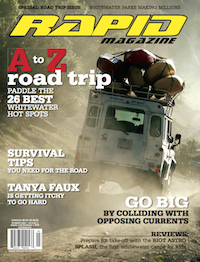The endless Rocky Mountain winter was showing signs of retreat: tawny tufts of grass hugged a ground that reeked of thawing dog shit; puffs of thermals enshrined the nearby peaks the way a ballerina’s tutu protects her from indecency; chunks of discarded ice ground languorously downstream from the tug of gravity. Sean, Spencer and I had long been incubating spring paddling plans. But in Alberta, seasons loiter like eighth-graders at a 7-11. Spring and winter were still deadlocked in their annual tug-of-war and the life-giving melt was still months away. It was not the place for hydrophiles.
That’s where Jessica, the belle of 1981, rolled into the picture. At 25 years, she was showing signs of her age. A full 497,458 kilometres into her life, the maroon Volvo wagon favoured one side, limping to the left like she had a degenerative hip. Shards of brittle frame crumbled like lepers’ sores with each slam of her steel doors. And she had bad gas.
Philosophers and biologists don’t always see eye to eye, but they’ll generally agree that humans separate themselves from the rest of the animal kingdom by letting rational thought guide their behaviour. But as I slung my gear into Jessica while the rest of the West slept, I wondered if the paddling sub-species might have more in common with some of our hydrophilic cousins in the animal kingdom than we do with Plato.
As the dry air ripped through my shaggy fleece, it was obvious that when it comes to paddling, measured judgment takes a back seat to the same compulsive forces that drive wildebeest on their annual 3,000-kilometre trek across the vast, arid Serengeti Plain. Unable to go more than a few days without fresh water, wildebeest are continually on the move, exposing themselves to constant attack from lions, cheetahs and packs of spotted hyenas. Sometimes it’s not even the predators that get them, but the rigours of al- ways needing to find a fresh wa- tering hole.
The hyenas were nipping at Jessica’s back bumper as she rumbled up to Sean’s place a bit late. Both Spencer and Sean were hunched over their gear bags, shivering beside the curb. We had three days, a ten-year-old’s weekly allowance between us, and our sights set on any old creek in B.C. that held enough water to float our boats.
The other cars that passed us on the road seemed so clean and business-oriented while Jessica chugged along like a circus rig moving to the next small town. As we roared over the Rockies, a late-winter emission from Sean’s poorly stored gear bag caught an airborne back-eddy and wafted forward. Spencer threatened to tie it to the roof, but the rack that held the boats was itself a dubious set-up. The 1981 factory rack was not designed for bulbous creek boats, and it didn’t help that the paint around one of the brackets was bulging with internal rust.
There was no music to drown out the sounds of the shifting boats on the three-legged rack, no backbeat for the distracting stench that was reminiscent of a Junior-A hockey team’s dressing room. Only the façade of my radio remained. It had crackled its last AM country radio station a year ago before sending itself out to pasture.
Three hours later, high from the booty hotbox, I down-shifted Jessica with savage satisfaction into B.C.’s Columbia Valley and stopped at a thin veneer of crystal-clear water rushing over a chaotic mangle of rocks in the bed of Toby Creek.
“This is ass low,” commented Sean tersely.
“I’ve paddled it with just a little more water than this,” Spencer countered, unstrapping the boats. Toby Creek’s classic Seven Canyons run wasn’t its char- acteristically explosive self today, but it fit one criteria – it had water. After the cold, early morning and the reeking ride, a few gulps of whitewater on Toby Creek would relieve some of our dehydration.
Like a heroin fix, Toby only evened us out. The next morning we wanted our high and the Bull River was our next chance at finding an intoxicating flow. But the Bull wasn’t in much of a bucking mood and it’s exclamation point ended up being not a class IV rapid but a desolate, frost-heaved logging road. With only one car we had to hoof it in tight booties for two hours to complete the shut- tle. Conversation gravitated toward paddling, but the sto- ries hid behind the veil of winter; memories were distant and hazy. Underneath it all lingered my thoughts of Jessica and the abusive terrain we pushed her over to get to another “too-damned-early” run.
The Bull left me tired, but not depleted like I am after full sphincter contractions on a wild piece of river. That drowsiness eluded us all as we camped for the second night without the benefit of a tent in the bramble bushes of a rest area. Our choice of bivouac suited our float through purga- tory. We were on the way to somewhere; we just weren’t there yet. I fell restlessly to sleep; vaguely aware that each time I shifted, a nearby thorn pulled a puff of feathers from my down bag and into the night.
Drawn by water like a tree sinking its roots deep into the mois- ture of the earth, we woke unnaturally early and summoned ourselves to the curiously named Upper-Lower reach of the Elk. Hoping it would bring some satisfaction to our wanderings, Spencer and Sean jumped out of Jessica to check the flow. The deep-toned growl from below suggested a runnable reach. We could plainly see Leap of Faith, a robust 50-foot waterfall that tumbled off the lip like a pleated wedding dress. Early sea- son or not, Sean was an oak root boring through a lead pipe to get to water. He headed upstream to find a put-in above the falls. Spencer and I offered to run safety.
Avoiding Leap of Faith was a leap of faith in itself. The only other access into the gorge was a set of cart tracks used to lower workers to a small hydro plant. Most rail grades don’t exceed 2 per cent, pleasant for bicycling seniors. But even the gnarliest freeriders wouldn’t touch this grade; the tracks plunged to river’s edge at a 45-degree angle.
My foot slid around inside my half-dry booty as I kicked some of the loose rocks out of the way on the fourth creosote-oozing railway tie. My gut worried about Spencer behind me. A slip and he would turn into a helmeted bowling ball. My boat dug painfully into my shoulder nerves, my paddle hand tingled and my legs began to wobble. Even a fall near the bottom would have spelled disaster, but we just giggled. The trip—festering gear, greasy grub and camping an unknown distance from heaven or hell—had turned us into giddy fools. We wobbled unceremoniously to the edge. Sean made a much grander entrance than us, tossing himself over Leap of Faith and showing us his sea-legs were more stable than our land-legs.
My shaky thighs felt more comfortable jammed inside my mango boat as it carved into the current behind Spencer. I could feel the pull of the heavy water, it felt like a thick mid- summer glacial rapid on a hot day. The hours driving through an arid early spring in a boxy freight car didn’t seem so bad now. Our glass was filled to the brim and we were chugging it down.
Like most good drinks, it came in a short glass. After two kilometres we were done and had to climb out of the eroded masterpiece up a similarly steep incline, the climb made tough- er by the fact we were climbing away from water. It was like a wildebeest feeling the heat descending on another dry season after barely whetting its muzzle at the end of another Serengeti cycle. Like the wildebeests’, our journey was worth it, neces- sary. Without it, we risked withering away waiting for water to come to us.
From a distance, we could see that Jessica didn’t look as relieved as we felt. She was listing. That was normal; her shocks had absorbed their last bump long ago. But she was sagging more than that. She was flat on one side. Yesterday’s Bull must have done her harm.
“She’s got enough air to get us to Fernie,” declared Sean, a man with grease under his fingernails often enough you know you can trust him.
“You guys got five bucks?” Spencer asked as Jessica hobbled to a stop in front of Fernie’s 7-11. We pooled together some change and he came back in an instant with a bag of salt-and-vinegar chips and a can of Flat-Fix. We read the warning sign on the label, made sure we had the valve cap off, and unloaded the toxic gob into Jessica’s atrophied limb.
She drank it down like a can of Red Bull before the third period, and we slammed her heavy doors and sped away—as per the instructions—to make sure the foam spun evenly throughout the tire. The tire was now un-salvageable for the long term, but we would get home and complete the loop.
The icy air that had sent us away had lost some of its bite as we crossed back over the Rockies and into Alberta. Sean’s booties, the precarious rack and the mute radio were all a little less demoralizing. We had tasted water after the long winter’s drought. Jessica was another story. Her Flat-Fix high was wear- ing off and a faint squealing sound made me worry that one of her bearings was giving out. Either that or it was the yipping of an approaching hyena.
Raymond Schmidt wrote about re-discovering the Cascade River in the Summer, 2005, issue of Rapid.
 This article first appeared in the Summer 2006 issue of Rapid Magazine. For more great content, subscribe to Rapid’s print and digital editions here.
This article first appeared in the Summer 2006 issue of Rapid Magazine. For more great content, subscribe to Rapid’s print and digital editions here.



